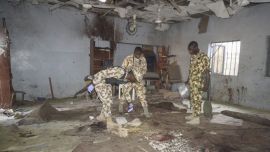SANTIAGO STILL MISSING. Sadly, the whereabouts of Santiago Maldonado are still unknown, but there were a series of developments this week with the public’s eye still drawn to the case. Security Minister Patricia Bullrich has reportedly asked for the case not to be investigated as a forced disappearance, though she conceded there may have been “misconduct” by some Gendarmerie (Border Guard) officers. With the investigation now seemingly focused on the roadblock set up on Route 40, theories and witnesses still continue to come forward. The family meanwhile, have asked for Judge Guido Otranto to be removed from heading the case, with Santiago’s brother Sergio Maldonado saying the only realistic theory left to explain what happened is that he was “taken by police.”
EDUCATIONAL ANGER. High-school students holding banners take part in a march on the 41st anniversary of the “The Night of the Pencils” as they protest against an educational reform in Buenos Aires on September 15, 2017. “The Night of the Pencils” was a infamous series of kidnappings and forced disappearances, followed by the torture, rape, and murder of a number of young students in September 1976, during the last military dictatorship. The controversial educational reform for secondary schools in the Argentine capital includes compulsory labour practices and prompted student protests that have included occupation of their schools, raising concern about the possible intervention of security forces against future claims.
MINOR MALVINAS FURORE. The government expressed its disappointment to Uruguay this week as the Malvinas (Falkland) Islands were at the centre of another, albeit minor, diplomatic storm. The Foreign Ministry was upset by a ‘Falkland Islands stand’ that formed part of Britain’s pavilion at the Expo-Prado, an agricultura and industry show in Uruguay. The low-profile stand featured pamplets and leaflets and encouraged people to visit the island. The Mauricio Macri administration formally expressed its concern over the stand and asked for “understanding” from Uruguay, which reiterated its support for Argentina’s sovereignty claim. Uruguayan’s Foreign Minister Rodolfo Nin Novoa said it was a “private-sector issue.”
EXPERTS CONCLUDE NISMAN WAS MURDERED. Tere was a major development this week in the investigation into the death of Alberto Nisman, the late special prosecutor, that made headlines in the national and international press. A team of investigators looking into the death of Nisman – who was found dead of a gunshot wound to the head in his apartment in January 2015, hours before he was due to present allegations against then-president Cristina Fernández de Kirchner – concluded this week that he had been murdered and did not commit suicide. According to reports, 28 experts determined that Nisman was killed by a shot to the head and that the perpetrators had attempted to cover their tracks, mocking up the dead body to make the murder look like a homicide. Prosecutor Eduardo Taiano will now have to decide whether he accepts the conclusions and recommendations of investigators by mid-October.
According to reports on Infobae, only two footprints were found in the room, suggesting that others had been removed, while suspicious bruises were also discovered. The experts also found that the position and angle of the gunshot wound were inconsistent with the thesis he shot himself. Traces of the horse tranquilizer (and sometimes party drug) Ketamine were also found in his body.
INFLATION CONTINUES TO SLOW, UNEMPLOYMENT DROPS. The government’s national statistics agency, INDEC, says consumer prices rose 1.4 percent in August, posting further evidence that inflation is gradually slowing. That number marked a 0.3 percent drop when compared to July’s rate of 1.7 percent and though inflation seems to be slowing, it means the 12-month annual figure is likely to exceed the government’s upper target of 17 percent. At present, accumulated inflation for the eight months of the year that have passed totals 15.4 percent.
The Central Bank previously set its national inflation target at between 12 and 17 percent for the year, though most analysts thought the final figure would exceed those hopes. August’s figure was led by consumer price increases in the health industry (+2.5 percent rise), living expenses (+ 2.2 percent) and food (+2.1 percent).
President Mauricio Macri’s government received another welcome boost this week with the news that unemployment in Argentina fell to 8.7 percent in the second quarter of 2017, dropping from 9.2 percent in the first quarter. The figures were issued by the INDEC national statistics agency on Thursday. By way of comparison, in the second quarter of 2016 unemployment officially stood at 9.3 percent. Despite the fall in unemployment, the “economically active” population fell to 12.48 million, down from 12.50 million in the same period a year previous. In other economic news, Finance Minister Luis Caputo said on Monday that the Inter-American Development Bank (IADB) will probably lend Argentina more money than initially inticipated.
“I dare say that in 2019 as well the (IADB’s) floor will be another $2.3 billion,” Caputo said, saying that total financing from the institution’s private arms to firms will reach US$10 billion by the end of 2019, above previous expectations of around US$6 billion. IADB President Luis Moreno confirmed those figures at a joint press conference during a visit to the capital. The IADB and World Bank has increased lending after the Macri administration settled its long-running dispute with holdout creditors last year. The Finance Ministry said on Wednesday it had also refinanced US$1 billion in maturing treasury notes, including US$600 million in 182-day notes expiring in March 2018, after receiving requests totalling US$2.6 billion for that issuance and additional 378-day notes expiring in September 2018.



















Comments